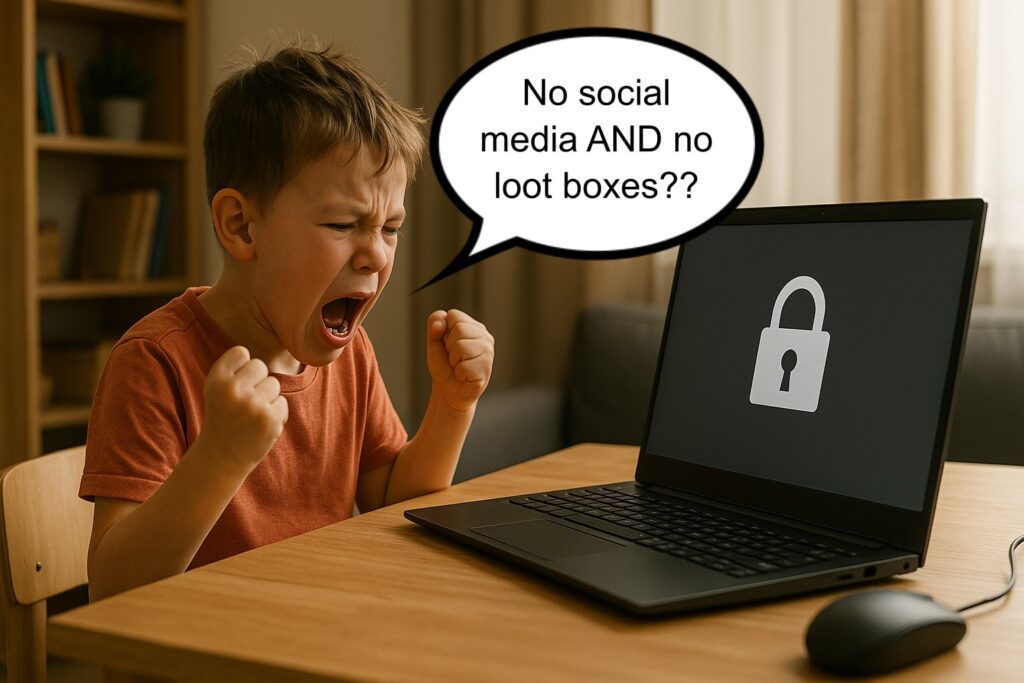In this week’s edition of the GME3, we’re looking at concerns coming from Canadian mental health experts surrounding the impact that gambling-like features in video games, like loot boxes, are affecting the youth, proposed legislation in New Zealand that would ban users under the age of 16 from accessing social media, and a $25 million copyright suit being brought against U.K.-based hosting provider Innetra PC in California. Read the full stories below!
Gambling
Skins in the Game
Some Canadian mental health professionals are raising alarms about the gambling-like features embedded in video games, particularly loot boxes, and their impact on youth. Dr. Daniela Lobo, a psychiatrist at Toronto’s Centre for Addiction and Mental Health (CAMH), reports seeing teenagers – some as young as 16 – spend their savings on loot boxes, often without realizing the activity mimics gambling. These purchases, which offer randomized virtual items like weapons or cosmetic “skins,” are linked to negative outcomes such as school absences, lower grades, and family conflict.
A 2023 CAMH survey found that nearly 25% of Ontario students in Grades 7 to 12 had engaged in gambling while gaming. Though loot boxes are not officially classified as gambling in Canada, experts argue they act as a gateway, reinforcing reward-based behaviours similar to slot machines. Pediatric psychologist Dr. Loredana Marchica likens the unpredictability of loot boxes to pulling a lever on a slot machine, reinforcing risky reward patterns in young users.
While countries in Western Europe have introduced regulations or bans on loot boxes, enforcement remains inconsistent, and workarounds like IP masking limit effectiveness. In Canada, Quebec has studied the issue, but no concrete action has followed.
Dr. Lobo warns that though only a small percentage of students show signs of gambling problems, the consequences can be severe. She urges parents to talk with their children early about healthy tech habits and to be aware of potential risks.
Media
Age Against the Machine
New Zealand Prime Minister Christopher Luxon has proposed new legislation that would ban children under 16 from accessing social media, joining a growing international push to protect minors from harmful online content. The draft laws would require social media companies to verify users’ ages, imposing fines of up to NZ$2 million (US$1.2 million) for non-compliance.
Modelled after Australia’s recent legislation – the strictest of its kind – New Zealand’s proposed rules reflect mounting concerns over the impact of social media on young people. Luxon said the move was prompted by ongoing feedback from parents who are struggling to control their children’s exposure to digital platforms filled with violent, explicit, and disturbing content. “This is about protecting our children,” he emphasized, urging tech companies to step up their responsibilities.
The legislation has yet to be introduced to parliament, and its passage will depend on support from Luxon’s two coalition partners. Still, the prime minister expressed optimism about cross-party backing.
Australia’s November 2024 ban on under-16s using platforms like Instagram, Facebook, and X met significant resistance from major tech firms, who criticized the law as vague and rushed. New Zealand may face similar opposition, but the government appears determined to prioritize child safety over industry pushback.
Entertainment
Stream and Punishment
The International Broadcaster Coalition Against Piracy (IBCAP) has filed a $25 million lawsuit in the U.S. against U.K.-based hosting provider Innetra PC and its general partner, Elna Paulette Belle, alleging contributory and vicarious copyright infringement. The suit, brought in the Northern District of California, accuses Innetra of enabling illegal streaming of content from 22 IBCAP member channels through at least 15 pirate services operating in the U.S.
According to the complaint, Innetra used its servers in the Netherlands to deliver about 15% of all unauthorized IBCAP member streams detected in 2024. Despite receiving over 300 takedown notices from IBCAP, the company ignored all but one, and in that single response, it explicitly refused to comply. Innetra even states on its website that it prioritizes protecting clients from U.S. Digital Millennium Copyright Act (DMCA) claims.
IBCAP is seeking an injunction to stop Innetra’s transmission of its members’ content, as well as statutory damages of up to $25.65 million for 171 registered works. Additional damages, profits, and legal fees related to unregistered works are also being pursued. Belle is named personally for her role in directing and allowing the infringement.
This is IBCAP’s third major suit targeting foreign hosting providers. A prior case against Datacamp ended in a $3 million settlement and policy changes. A second case against Virtual Systems is ongoing. IBCAP Executive Director Chris Kuelling warned that any provider ignoring takedown requests risks legal action.
GME Law is Jack Tadman, Lindsay Anderson, and Will Sarwer-Foner Androsoff. Jack’s practice has focused exclusively on gaming law since he was an articling student in 2010, acting for the usual players in the gaming and quasi-gaming space. Lindsay brings her experience as a negotiator and contracts attorney, specializing in commercial technology, SaaS services, and data privacy.
At our firm, we are enthusiastic about aiding players in the gaming space, including sports leagues, media companies, advertisers, and more. Our specialized knowledge in these industries allows us to provide tailored solutions to our clients’ unique legal needs. Reach out to us HERE or contact Jack directly at jack@gmelawyers.com if you want to learn more!
Check out some of our previous editions of the GME3 HERE and HERE, and be sure to follow us on LinkedIn to be notified of new posts, keep up to date with industry news, and more!




